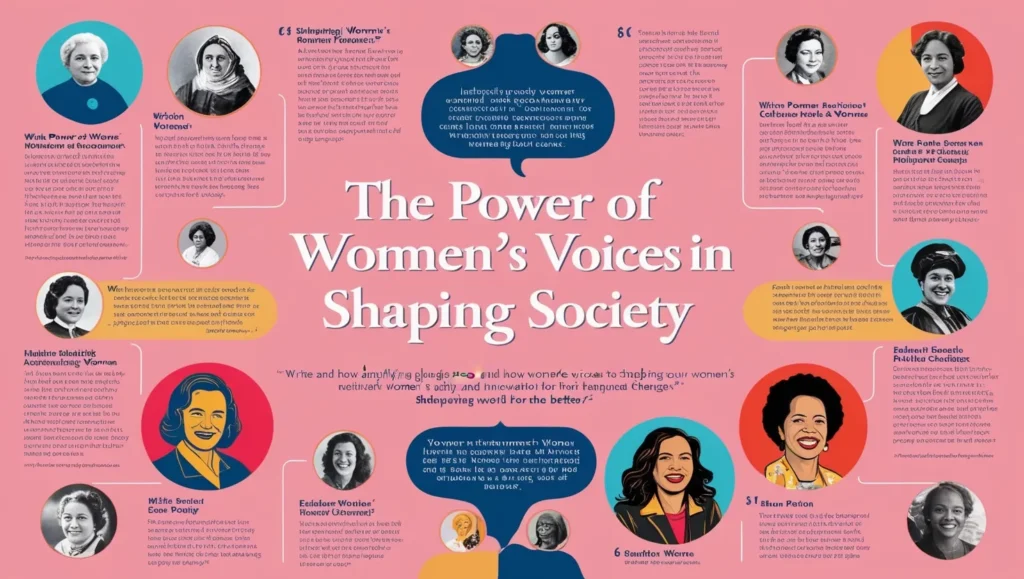The Power of Womens Voices in Shaping Society
Throughout history, the voices of women have been instrumental in shaping society, driving progress, and fostering change. Women’s contributions have transcended boundaries, influencing culture, politics, science, and social movements. From grassroots activism to global leadership, the power of women’s voices continues to challenge norms, inspire action, and build a more inclusive and equitable world.
In this blog, we will explore the profound impact of women’s voices, the challenges they have faced, and the transformative changes they have ignited. We will also highlight inspiring examples and discuss how amplifying women’s voices can shape a better future for all.
The Historical Struggle for Women’s Voices
For centuries, women’s voices were silenced or marginalized by patriarchal systems. Women were excluded from decision-making processes, denied education, and often restricted to domestic roles. Despite these challenges, women found ways to make their voices heard, often through unconventional means.
- Suffrage Movement: Women like Susan B. Anthony, Emmeline Pankhurst, and Sarojini Naidu fought tirelessly for women’s right to vote, challenging deeply ingrained societal norms.
- Hidden Contributions: Women like Rosalind Franklin in science and Ada Lovelace in computing made groundbreaking contributions, often without recognition during their lifetimes.
These historical struggles highlight the resilience and determination of women to claim their place in shaping society.
Women’s Voices in Modern Society
Today, women’s voices resonate louder than ever, driving social, economic, and political change. From grassroots movements to boardrooms and parliaments, women are leading the charge for progress.
1. Women in Leadership
The rise of women in leadership roles is reshaping organizational and governmental landscapes. Leaders like Jacinda Ardern, Angela Merkel, and Kamala Harris demonstrate how women bring unique perspectives to leadership, emphasizing empathy, collaboration, and innovation.
2. Social Movements
Women have been at the forefront of transformative social movements:
- #MeToo Movement: Sparked by Tarana Burke, this movement brought global attention to issues of sexual harassment and assault, amplifying survivors’ voices.
- Climate Activism: Figures like Greta Thunberg and Wangari Maathai have used their voices to advocate for environmental justice and sustainable practices.
3. Arts and Media
Through storytelling, women have redefined narratives, challenging stereotypes and inspiring generations. Authors like Chimamanda Ngozi Adichie, filmmakers like Ava DuVernay, and musicians like Beyoncé have used their platforms to advocate for gender equality, racial justice, and empowerment.
The Ripple Effect of Empowering Women’s Voices
1. Economic Growth
When women’s voices are included in economic decision-making, societies flourish. According to research, companies with diverse leadership are more innovative and financially successful. Microfinance initiatives led by women, such as those pioneered by Grameen Bank, have lifted entire communities out of poverty.
2. Social Equity
Women’s voices have been pivotal in advancing social equity. Advocacy for equal pay, reproductive rights, and education for girls has created opportunities that benefit families, communities, and nations.
3. Inspiring Future Generations
When women speak out and lead, they inspire younger generations to dream bigger and strive for change. Representation matters, and seeing women in diverse roles motivates girls to pursue their aspirations without fear of societal limitations.
Challenges to Women’s Voices
Despite progress, women still face significant barriers to having their voices heard:
- Cultural and Structural Barriers: Gender norms and systemic inequalities often discourage women from speaking up.
- Online Harassment: Women leaders and activists face disproportionate abuse on digital platforms, which can silence their voices.
- Underrepresentation: In many sectors, women remain underrepresented, limiting their influence on critical decisions.
Addressing these challenges requires collective action, including education, policy changes, and societal shifts in attitudes toward gender roles.
How to Amplify Women’s Voices
- Support Women-Led Initiatives: Champion organizations and movements led by women that address social and economic inequalities.
- Create Inclusive Spaces: Ensure women have equal opportunities to participate in discussions, leadership roles, and decision-making processes.
- Mentorship and Sponsorship: Encourage mentorship programs where established leaders support and guide women in their careers and activism.
- Challenge Gender Stereotypes: Educate communities to challenge stereotypes and foster environments where women feel empowered to speak up.
Inspiring Stories of Women Shaping Society
Malala Yousafzai
Malala’s advocacy for girls’ education, even in the face of violence, has made her a global icon. Her voice has brought attention to the barriers millions of girls face in accessing education.
Ruth Bader Ginsburg
As a U.S. Supreme Court Justice, Ginsburg championed gender equality, ensuring that women’s voices were considered in landmark legal decisions.
Ngozi Okonjo-Iweala
As the first woman to lead the World Trade Organization, Ngozi Okonjo-Iweala demonstrates how women’s voices can shape global economic policies.
Final Thoughts
The power of women’s voices in shaping society is undeniable. From advocating for equality and justice to driving innovation and progress, women have been—and continue to be—at the forefront of change. By amplifying and supporting women’s voices, we not only honor their contributions but also create a more just, inclusive, and equitable world for everyone. Let us continue to listen, uplift, and celebrate the voices of women as they lead us toward a brighter future.

